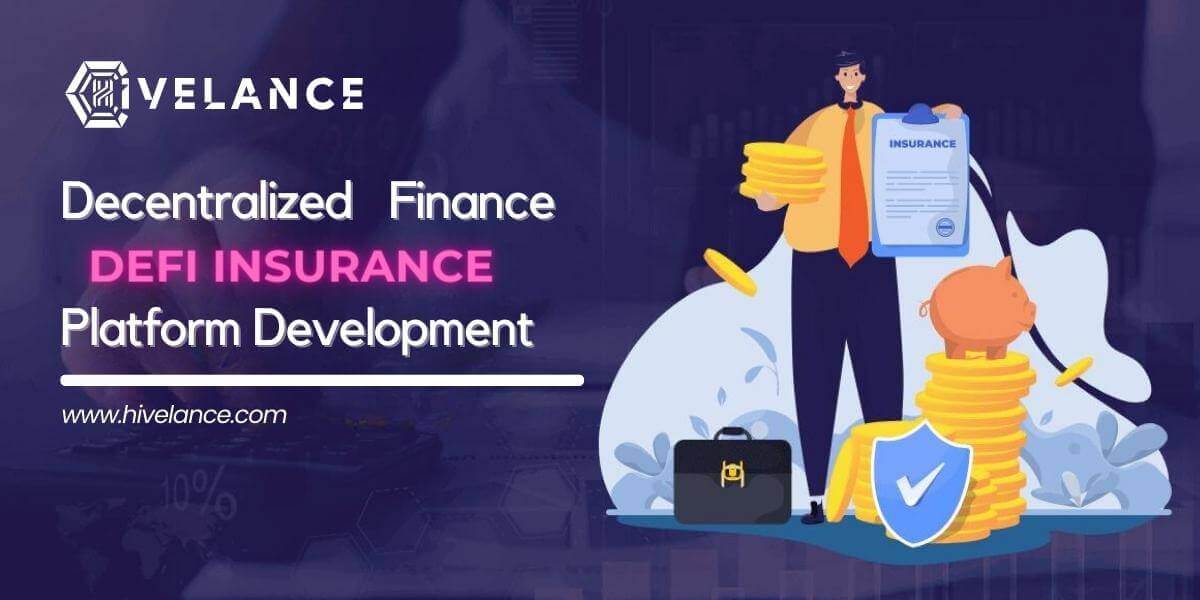Decentralized Insurance Platform Development
Decentralized Insurance Platform Development Company is the process of creating a platform or dApp using open-source DeFi protocols. The hazards and difficulties in the existing traditional insurance can be removed by this decentralized insurance, which can also improve the insurance’s reliability, security, transparency, and dependability.
Hivelance is a renowned DeFi Insurance Platform Development company provides decentralized insurance solutions through the development of both DeFi insurance dApps and DeFi insurance platform.
Knowing the Details of Decentralised Insurance
The blockchain is a distributed, immutable ledger which underpins DeFi insurance. In contrast to traditional insurance, decentralized insurance leverages smart contracts and decentralized platforms to deliver a reliable and open insurance process, where an insurance company operates as a centralized authority, assesses risks, and settles disputes.
Our DeFi Insurance Platform Development services
- DeFi Smart Contract Development
- DeFi Token Development
- DeFi Dapp Development
- DeFi Yield Farming Development
- Debt & Borrowing Development
Key features of our DeFi Insurance Platform Development
The following are the key features of our developed DeFi Insurance platform.
-
Fully examined smart contracts
-
Integral cyber defense
-
Substantial automation
-
Switching Ethereum Tokens
-
Ultra-Transparent Way
-
Insurance for cryptocurrency wallets
-
Protection of Collateral for Loans Supported by Crypto
-
Complete government
-
Set up for managing claims
Perks of creating Decentralized Insurance platform
One of the most important benefits of decentralized insurance is that a wider range of people and companies can use it. On the other hand, typical insurance models are restricted to specific geographical areas or demand substantial documentation, credit checks, or collateral, thereby rendering it difficult for some demographics to acquire coverage.
Decentralized Insurance platforms are made more accessible, offering protection to those that are underserved and don't have access to conventional financial services. More people can defend themselves against dangers and unforeseen disasters because of this inclusion.
Decentralized Insurance does away with the middleman that are usually a part of conventional insurance schemes. The entire operational costs are greatly decreased because brokers , and other intermediaries are not required. Policy holders will benefit from lower premiums as a result, and insurers will be able to offer more alluring returns.
Transparency and trust are guaranteed by the blockchain technology that enables the creation of decentralized insurance platforms. A public ledger that is available to all participants contains records of all transactions, insurance policies, and claims. As a result of being able to confirm the terms of their policies and follow the progress of claims in real time, this level of transparency fosters among policyholders.
-
Simplified and quick claims processing
The claims procedure is automated in decentralized insurance platforms by smart contracts. When predetermined requirements are properly met, the smart contract immediately triggers the claim payout such as the occurrence of a covered event. This automation decreases the likelihood of delayed or denied claims and eliminates the need for time-consuming claim investigations. Faster claim resolutions for policy holders might result in higher client satisfaction.
-
Fraud and security prevention
Decentralized insurance platforms make use of blockchain technology’s security features. Data saved on the blockchain is immutable, it cannot be changed or tampered with which means that once it has been recorded. As policy information and claims data are securely kept and cannot be changed with network approval, this lowers the danger of fraudulent activities.
A skilled DeFi Insurance Platform Development business can assist in enhancing policy design flexibility. Smart contract developer’s incorporate programmable policy parameters and allow consumers to obtain well-tailored insurance coverage in accordance with their particular demands, who can offer detailed information about the desirable plan. It gives policyholders the ability to create insurance plans that match their risk profiles.
P2P insurance models can be facilitated by decentralized insurance platforms. Owners who face comparable risks and use their combined resources to cover one another. Participants in this community based approach develop a sense of trust and support for one another.
Traditional insurance sometimes has difficulties providing coverage across international borders due to different restrictions and complexity. Blockchain technology enables the development of decentralized insurance platforms which can get around these problems. It provides world wide coverage without the need for large cross-border infrastructure.
-
Minimized Counterparty Risk
Policyholders of decentralized insurance interact with the smart contract directly rather than with a centralized insurance provider. Due to the fact that policyholders no longer have to worry about an insurer's financial viability, counterparty risk is reduced.
How does Decentralized Insurance function ?
Risk is pooled through insurance. People look for insurance to offset the risk when a probable disaster poses the possibility of being financially damaging. By requiring everyone to pay premiums, insurance companies give the individuals the opportunity to pool that risk.
Each customer pays a much lower premium than they would in the event of an emergency. Insurance companies wager that the sum they receive from customers will be significantly less than the sum they would be required to pay out in claims.
Both the pooling of risks and the settlement of claims are handled by the same central entity. In the past, a policyholder had to offer proof of a loss and justification for a claim. This claim procedure costs a lot of money for the insurance business.
Decentralized Insurance Applications
Blockchain and smart contract power decentralized insurance , which has the potential to disrupt many industries by providing creative and effective insurance solutions.
Let us examine some well-known applications of decentralized insurance in several fields.
- Microinsurance
- Health Insurance
- Agriculture Insurance
- Trade Insurance
- Automobile Insurance
- Property Insurance
- Travel Insurance
- Flight Insurance
- Event Insurance
Top DeFi Insurance projects
Most insurance sectors are ready to transition to decentralized finance so they may provide their clients additional attractive elements:
-
Nexus Mutual
-
CDx
-
Etherisc
Why Choose Hivelance For DeFi Insurance Platform Development ?
As a DeFi Development Company, we ensure that the continual security assessments to basically fix smart contract weaknesses, and the implementation of strong bug bounty programs are performed. Hivelance creates a number of DeFi applications and services that support decentralized finance.
With the help of our experience working in the DeFi environment, we have been able to create a number of apps for the DeFi platform that promote customer pleasure and the advancement of decentralized finance. We will create a solid platform for your insurance company with the best features and functions if you talk to us about your ideas and expectations.
 Trends
Trends
 Crypto
Crypto
 Web 3.0
Web 3.0
 AI
AI
 Blockchain
Blockchain
 Fintech
Fintech
 Company
Company


















